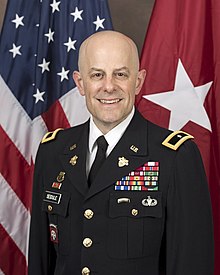Ty Seidule

James Tyrus Seidule (born July 3, 1962), known as Ty Seidule, is a retired United States Army brigadier general, the former head of the history department at the United States Military Academy, the first professor emeritus of history at West Point, and the inaugural Joshua Chamberlain Fellow at Hamilton College. Seidule is also the Presidential Advisor to The National WWII Museum in New Orleans and a fellow at New America. In February 2021, Defense Secretary Lloyd Austin appointed Seidule as one of four representatives of the US Department of Defense to the Commission on the Naming of Items of the Department of Defense that Commemorate the Confederate States of America or Any Person Who Served Voluntarily with the Confederate States of America, including US Army installations named for Confederate soldiers.
Quotes
[edit]- As a retired U.S. Army soldier and as a historian, I consider the issue simple. My former hero, Robert E. Lee, committed treason to preserve slavery. After the Civil War, former Confederates, their children, and their grandchildren created a series of myths and lies to hide the essential truth and sustain a racial hierarchy dedicated to white political power reinforced by violence. But for decades, I believed the Confederates and Lee were romantic warriors of a doomed but noble cause. As a soldier, a scholar, and a southerner, I believe that American history demands, at least from me, a reckoning.
- Robert E. Lee and Me: A Southerner's Reckoning with the Myth of the Lost Cause (2020), p. 9
- When the Supreme Court issued its decision in Brown v. Board of Education in 1954, it overturned one aspect of the carefully constructed system of the racial police state in the South. Virginia did not accept the Supreme Court's decision. Initially, the Virginia governor Lindsay Almond counseled moderation, but the U.S. senator Harry Byrd, who controlled Virginia politics with an iron fist, reacted with fury when he heard Almond would acquiesce to the highest court in the land. "The top blew off the U.S. Capitol," Almond recalled. Byrd announced the state's strategy in 1956: "If we can organize the Southern states for massive resistance order... the rest of the country will realize that racial integration is not going to be accepted in the South." Almond was soon on board, declaring, "We will oppose with every facility at our command, and with every ounce of our energy, the attempt being made to mix the white and Negro races in our classrooms." Virginia followed that pronouncement with laws to back up its position, ordering schools to shutter rather than integrate.
- Robert E. Lee and Me: A Southerner's Reckoning with the Myth of the Lost Cause (2020), p. 66-67

